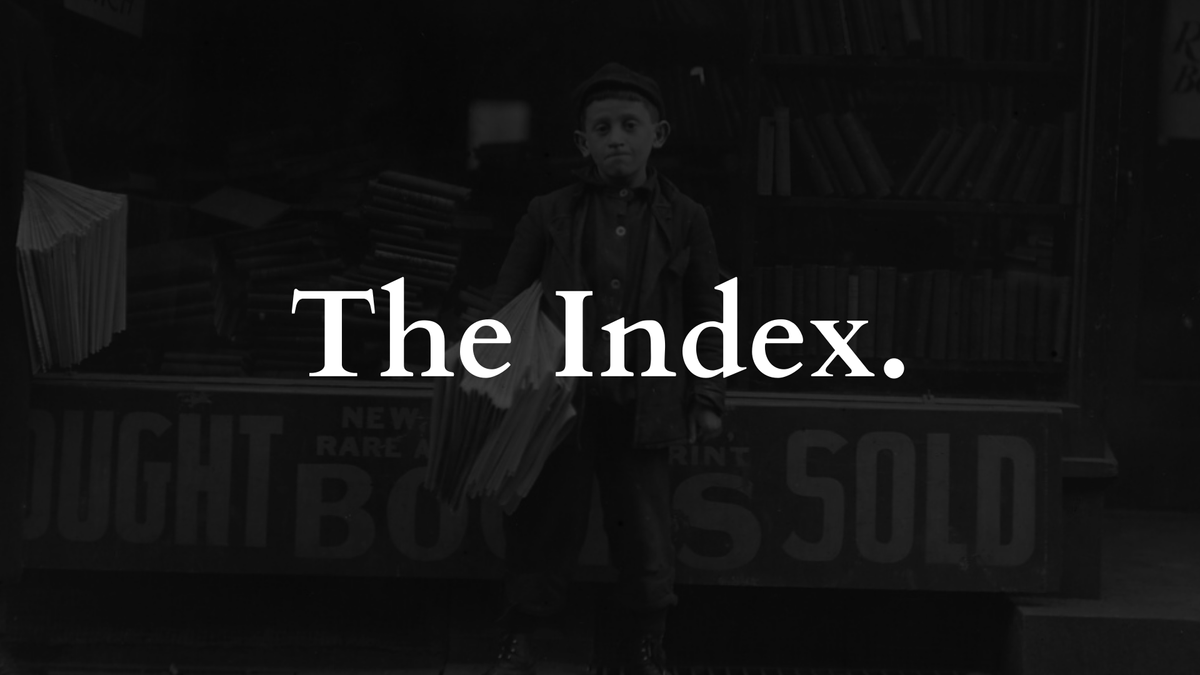A Letter from the Editor: Why The Index Is Choosing Reader-Supported Journalism

Today, I'm launching The Index - a new publication focused on thoughtful, independent journalism and editorial opinion that matters. From day one, we're taking a stance that's both principled and practical.
We'll be funded solely by donations and by our readers through subscriptions, not venture capital or billionaire owners.
Here's why.
Money warps reality. This seems obvious when we talk about political lobbying or regulatory capture, but becomes strangely controversial when discussing media ownership. The standard counterargument goes something like: "But good billionaires exist! They'll protect editorial independence through noble governance structures and Chinese walls!"
Let's examine why this fails in practice.
First, consider the incentive structure of venture capital. VC firms operate on a specific playbook - deploy capital aggressively, grow rapidly, and exit (ideally) within 5-10 years. This works great for software companies where network effects and scalable infrastructure can support exponential growth. It works terribly for journalism, where quality scales linearly with journalist-hours and deep source relationships take years to cultivate.
When VCs inevitably discover that news organizations can't deliver software-style returns, they push for "optimization." This usually means:
- Aggressive pivot to video (despite repeatedly proven reader preferences for text)
- Layoffs of experienced journalists in favor of cheaper recent graduates
- Increased pressure for pageviews over investigation
- Sponsored content masquerading as reporting
- Algorithmic optimization for engagement over importance
But what about billionaire owners who genuinely want to preserve editorial independence? Even assuming perfect intentions (a heroic assumption), three structural problems emerge:
- The Observer Effect: Journalists inevitably self-censor on topics affecting their owner's interests - not through direct intervention, but through natural human risk-aversion. When your paycheck ultimately flows from Bezos, how aggressively will you investigate Amazon's labor practices?
- The Protection Racket: Sources and subjects treat billionaire-owned publications differently. They know the owner has other business interests that can be threatened or rewarded. "Nice tech company you have there. Shame if it faced increased regulatory scrutiny after that exposé."
- The Competence Problem: Most billionaires made their money in other industries. They typically lack deep understanding of journalistic culture and process. Even well-intentioned interference often damages the newsroom's ability to function effectively.
This is why The Index is taking a different path.
Our funding will come directly from readers and individuals who are committed to democracy, and who value thoughtful, independent journalism.
This creates natural alignment between our incentives and our mission. When our survival depends on producing work our readers find valuable enough to pay for, we're forced to maintain high standards and editorial integrity.
Some argue this model can't scale. But history suggests otherwise. Before consolidation and financialization, thousands of independent newspapers sustained themselves through subscriptions and local advertising. The internet disrupted this model, but new approaches are emerging - from reader-supported nonprofits to decentralized funding mechanisms.
This isn't about the personal virtues or vices of specific wealthy individuals. It's about system design. A system that requires billionaire benevolence to function is inherently fragile and corrupting. We need funding mechanisms that align naturally with journalistic integrity - whether that's reader revenue, nonprofit endowments, or new models we haven't yet discovered.
The real question isn't whether billionaires can theoretically own news organizations while preserving independence. It's whether that's the most robust and aligned structure we can design. History and incentive analysis suggest the answer is no.
On Individual Donors
Let me be clear about one point: The Index will accept donations from high-net-worth individuals. We aren't opposed to wealth - we're opposed to control. What matters is the structure of the relationship and the expectations that come with it.
A wealthy individual making a donation to support independent journalism, with zero expectation of editorial influence, is fundamentally different from an investor or owner seeking control or returns. The key distinction lies in the governance structure and incentive alignment. When a billionaire owns a publication, their influence is structural and unavoidable - it's built into the organization's DNA. When they make a donation without strings attached, they're simply joining our broader community of supporters.
Think of it like the difference between a wealthy patron donating to a museum versus buying it outright. The former supports the institution's mission while respecting its independence. The latter inevitably shapes its direction, regardless of intentions.
This is why we'll maintain strict policies around donations:
- No donation will come with any promise of editorial input
- Donors receive zero special access to our newsroom or editorial process
We believe this approach strikes the right balance between welcoming support from all quarters while maintaining genuine independence.
Our Commitment
By choosing reader support over venture capital or billionaire ownership, we're making a clear statement: The Index answers to its readers, not investors. This may mean growing more slowly. It may mean making hard choices about resource allocation. But it also means maintaining genuine independence and alignment with our core mission - providing thoughtful, uncompromised journalism.
As the saying goes, the problem with socialism is it takes too many evenings. The problem with billionaire-owned media is it requires too many perfect billionaires. At The Index, we're betting on a different model - one that aligns our success with serving our readers' interests. We hope you'll join us on this journey.
If you believe in this vision for independent journalism, consider becoming a founding subscriber of The Index or making a donation. Your support makes our work possible.